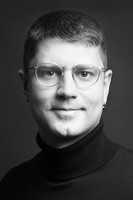Daniel Schuch
Daniel Schuch studied history, political science, and sociology at Dresden University of Technology from 2008-2012. He completed his master’s degree in History and Politics of the 20th Century at Friedrich-Schiller-University Jena in summer 2015. Since 2014, he has been a student assistant at the Imre Kertész Kolleg Jena, and the Chair for History in Media and the Public. In his master’s thesis, he analyzed the conflicting historical and political interpretations of the Kosovo war in the journal “konkret”. Since January 2016, he has been a research associate and doctoral candidate at the Europäisches Kolleg Jena.
Research projekt
Transformations of testimony. From the production of knowledge in David P. Boders research interviews to the moral meaning of the Holocaust (working title)
The collection and interpretation of accounts of the victims of National Socialism and the Holocaust have been subject to extensive societal changes since the end of the Second World War. What is the difference between the earliest audio recordings to video-interviews conducted later with people who are today classified as Holocaust Survivors or Contemporary Witnesses? And which influence did the specific goals and methods of the interviewers and the involved institutions have on the recordings?
The dissertation project answers these questions within the context of a historicisation of Holocaust testimony by means of a comparative interview-analysis. The starting point of the thesis is the 1946 interview collection of about 130 audio interviews with the so called Displaced Persons (DP) in Europe by American psychologist David P. Boder. A selection of interviews with five Jewish survivors is analysed. These audio records constitute a collection of early testimonies on the mass murder of European Jews. Boder’s psychological research on the traumatic impacts of the “man-made catastrophe” provides the context of the interviews: he was a social scientific pioneer of early Holocaust research avant la lettre.
Boder’s interviews from 1946 are exemplarily and episodically compared with the video recordings of the same persons from the collections of the USC Shoah Foundation and an Oral History Interview-Project of the United States Holocaust Memorial Museum, which were conducted as many as 60 years later. How the interpretations of the experiences, as well as the societal significance of the accounts in the context of the methods and goals of the various institutions evolved is examined with the findings from Oral History, social history and historical source criticism. The retelling of the Holocaust experiences is analysed through the concept of “recounting”, which was developed by American psychologist Henry Greenspan in contrast to the passively concept of “bearing witness”. As significant transitions can be seen that evolved concepts of interpretation of the experiences and the historical events, as well as an established claim of the institutions to convey moral “lessons” of the Holocaust have emerged.
Research interests
Holocaust and NS research
Memory cultures in the USA, Australia, Germany and Israel
audiovisual history presentation
Displaced Persons
Testimonies and Knowledge Production
Select publications
Konflikthafte Zeugenschaft. David P. Boders Audio-Interviews im Nachkriegseuropa, in: Mimeo. Blog der Doktorandinnen und Doktoranden am Dubnow Institut, 22.07.20.
(with Dorothea Warneck/ Tobias Haberkorn/ Saskia Pörtig/ Paul Schütrumpf) (Post-) jugoslawische Geschichtskultur: Ein Blick durch das Schlüsselloch, in: Lehrstuhl für Geschichte in Medien und Öffentlichkeit
